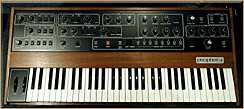Prophet-5


owner: Matt Bassett
"The Prophet 5 contains five individual voices. For its principal sound sources each voice contains two VCO's (voltage controlled oscillators), OSC A and OSC B, and a white noise source which can be mixed into a resonant low-pass VCF (voltage controlled filter). The filter modifies the voice timbre under control of its four-stage envelope generator. The filter may also be resonated and serve as a sound source. Following each filter, a VCA (voltage controlled amplifier), also controlled by a four-stage envelope generator, shapes the voice amplitude. Supplementing the basic voices are polyphonic modulation (POLY-MOD) signal routings within each voice that allow OSC B and the filter envelope generator to function as modulation sources applied to OSC A frequency or pulse width, or the filter frequency. Finally, there is a single LFO (low-frequency oscillator) and a pink noise source which can be mixed to modulate all five voices, as adjusted by the MOD wheel.
"The Prophet-5 sustained six revisions (or revs). Rev 1 was the original design. Rev 2 was a refinement of the original design and largely transparent. Rev 3, however, was a vastly different synthesizer than Revs 1 and 2. Introduced to Rev 3 were new voltage controlled IC's (CEM), an improved ADC, DAC, and a different control voltage distribution scheme. More sophisticated editing and tuning routines were designed, and to improve servicibility, voice trimmers were reduced from 80 to 45. Some believe that the Rev 3 synthesizers are slightly inferior (sonically) to their predecessors by revealing an absence in the lower frequencies. While this may be true, the majority of the Rev 3 synthesizers are far more operationally stable than their Rev 1 and Rev 2 counterparts.
"Instrument codes are coded by model number, followed by a period and then the rev level.
- 1000.1 -- Rev 1: Serial Numbers 1-182
- 1000.2 -- Rev 2: Serial Numbers 184-1299
- 1000.3.0 -- Rev 3: Serial Numbers above 1300
- 1000.3.1 -- Rev 3.1 adds some changes to the RAM.
- 1000.3.2 -- Rev 3.2 (USART, Analog)
- 1000.3.3 -- Rev 3.3 with 120 Programs
- 1001 -- Prophet-5 Synthesizer with Remote Keyboard
- 1005 -- Prophet-5 Synthesizer with Polyphonic Sequencer"
----Matt Bassett
Comparing the Rev2 to the Rev3
 |
Revision2
The Rev1 and Rev2 are drastically different synthesizers from the later model Rev3's and above. Below is a brief glance at some of the differences between the panels as seen on the Rev2 (pictured here) and the Rev3's pictured above.
|
 |
Modulation Section
- Preset button absent on rev3. Notice blank label, presumed to have once read "to tape".
|
 |
Filter Section
- Preset button absent on rev3. Notice worn label reading "from tape". This button was used with the "preset" button in the Modulation Section to double as cassette interface switches (after manufacturer's upgrade).
|
 |
Amplifier Section
- Different location of master volume knob
- Lack of dedicated cassette interface section
- Edit button: later models had instant editing and therefore don't have this button. Instead, Rev3's have the A440 tone button next to the "Master Tune" as well as the "Tune" button, to initiate auto-tuning (with a light in it).
|
| -this information and these images were provided by the owner of this Rev2, David Bellamy of Northants, England |

Who Played This Instrument?
Laurie Anderson,
Rod Argent,
Joan Armatrading,
Wally Badarou,
Dave Balfe of Teardrop Explodes,
Dave Ball of Soft Cell,
Tony Banks,
Richard Barbieri,
Katrina Bihan,
Michael Boddicker,
Andy Brown,
Arthur Brown,
Rabbit Bundrick,
Kate Bush,
Damon Butcher,
Jonathan Cain of Journey,
Kim Carnes,
Bob Casale of Devo,
Ian Catt,
Clannad,
Vince Clarke,
Richard Coles of Communards,
Phil Collins,
Michael Cotten of The Tube Group,
Colourbox,
Carl Cox,
Crowded House,
Steve Cunningham,
Chris Franke of Tangerine Dream,
Geoff Downes,
George Duke,
Electribe 101,
Electronic,
Anders Eljas of Abba,
Vic Emerson,
John Entwistle,
Larry Fast,
Johnny Fingers,
Paul Fishman,
Dave Formula,
Frontline Assembly,
Peter Gabriel,
Philip Glass Ensemble,
The Grid,
Groove Corporation,
Hall & Oates,
Paul Hardcastle,
Jerry Harrison,
Ritchie Hawtin,
Tony Hymas of Ph.D.,
Inner City,
INXS,
Mark Isham,
Japan,
Rick James,
Eddie Jobson of UK,
Charles Judge of Giorgio Moroder,
Brian Kehew and Roger Manning of The Moog Cookbook,
Kraftwerk,
Michael Karoli,
Kitaro,
Anton Levay of the Church of Satan,
Dean Klavett of Lene Lovich band,
Howard Leese of Heart,
Cory Lerios of Pablo Cruise,
Level 42,
Ian Lynn,
Robin Lumley,
Nick Magnus of Steve Hackett,
Masterworks,
Hideki Matsutahe,
Mad Professor,
Marcus Miller,
Jeff Mills,
Derrick May,
Gary Moore of La Mafia
Rene Moore,
Bill Nelson,
Neuronium,
New Order,
Chris Newman of Johnny Hates Jazz,
Gary Numan - in '79 and they had 5 onstage,
Andy Nye of Michael Shenker Group,
The Orb,
William Orbit,
OMD,
David Palmer of Jethro Tull,
Alan Parsons Project,
Dominique Perrier with J-M Jarre,
Steve Porcaro,
Andrew Powell,
Roger Powell,
Public Image,
Red Sun,
Nick Rhodes of Duran Duran,
Andy Richards,
Teddy Riley,
Terry Riley,
Peter Robinson,
Todd Rundgren,
Ryuichi Sakamoto,
David Sancious,
Pete Sears of Jefferson Starship,
Bill Sharpe,
Tim Simenon of Bomb the Bass,
Split Endz,
Startled Insects,
Dave Stewart,
David Sylvian,
The Talking Heads,
Tangerine Dream,
Tears For Fears,
Thompson Twins
Tomita,
Ultravox,
Ian Underwood,
Vangelis,
David Vorhaus,
Rick Wakeman,
Wang Chung,
Steve Winwood,
Richard Wright of Pink Floyd,
Andy Partridge and Dave Gregory of XTC - used extensively on their 1982 LP English Settlement,
Akiko Yano of Yellow Magic Orchestra,
Joe Zawinul,
Hans Zimmer
[Let us know if you have any further additions to this list.]

